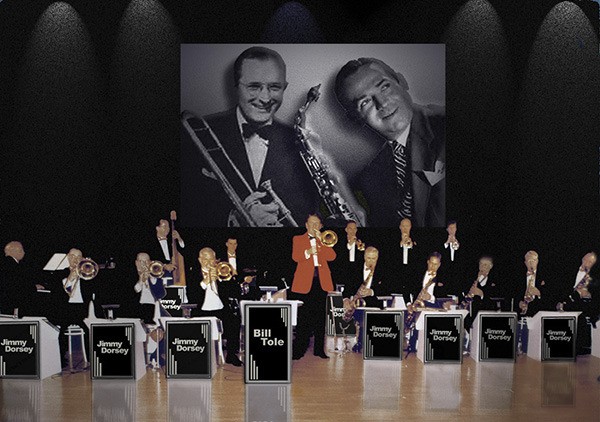For some it’s a memory, faded with age, but brought to life with a simple melody.
For others it’s a link to a bygone age, a simpler time, romanticized by more than seven decades.
And for yet others it’s simply about the music.
On Sunday the big band strains of the Jimmy Dorsey Orchestra come alive at the Auburn Performing Arts Center, with a matinee of standards from the ’30s, ’40s and ’50s.
“We’re preserving the American icon of the music of those days,” vocalist Kathy Knorr said. “And those that come to see it are just loving it. We still have people from that era coming, although many of them can’t dance like they did. They can still listen though.”
Jimmy Dorsey, along with his brother Tommy Dorsey, were among the mainstays of big band music in the first half of the last century.
The brothers – with Jimmy on saxophone, clarinet and trumpet and Tommy on trombone – started out together with the Dorsey Brothers Orchestra, but splintered in 1935 after an onstage argument about the tempo of a song.
Tommy started the Tommy Dorsey Orchestra and Jimmy continued on with the Dorsey Brothers, eventually renaming it the Jimmy Dorsey Orchestra.
Over the next 20 years, both brothers found success on their own, with Tommy helping a young Frank Sinatra get his start and Jimmy releasing several chestnuts, including “Pennies From Heaven” with Bing Crosby on vocals, “Amapola”, “Green Eyes” and “I’m Glad There Is You (In This World of Ordinary People).”
In the mid-1950s the pair reunited for a summer television replacement show for Jackie Gleason, where they introduced a young Elvis Presley to a nationwide audience, long before his appearance on the Ed Sullivan Show.
The brothers died within months of each other, Tommy choking in his sleep in 1956, and Jimmy succumbing to throat cancer in 1957, right after he received his first ever gold record for “So Rare.”
Jimmy’s orchestra, however, lived on.
Lee Castle took over musical leadership of the band for the next 40 years, with Jim Miller taking over from 1990 to 2002. In 2002, current music director Bill Tole took the helm.
Nancy Knorr, who owns the Jimmy Dorsey Orchestra trademark and sings many of the songs made famous by original female lead Helen O’Connell, came on board in 1991.
“I was a member of (vocal group) The Pied Pipers, which Frank Sinatra sang with, and had an opportunity to sing with the Jimmy Dorsey Orchestra,” she said. “I filled in and liked it, and that was history.”
The draw was simple, Knorr said.
“The songs, they tell a story. It was a very difficult era during the 40s, when loved ones were separated by the war. The music was uplifting and provided people a place to go and dance and get away. It’s still uplifting today.
“It’s American music,” Knorr added. “It was music that really came from the heart. A lot of it was jazz oriented, and the musicians would get together and just jam and have a good time. And that was contagious. I think that was what started it.”
Knorr said the credit for some of the continued popularity of the big band style of music rests on the shoulders of several contemporary singers.
“We have to thank singers like Harry Connick Jr., Rod Stewart and Michael Bublé,” Knorr said. “They’ve taken this music from Frank Sinatra and the arrangers and composers, and put their spin on it. They’re doing a tribute, with their spin on it. Young people come out in droves for those singers, and they just don’t realize the music goes back as far as it does.”
The show typically features two hours of music, with an intermission, Knorr said. For her, the high point is the ballad “Embraceable You.”
“It’s a standard that Sinatra liked so much he recorded it five different times,” she said. “The lyrics today are just as relevant. It’s one of those songs that just pulls your heartstrings.”
=====
Bravo presents the Jimmy Dorsey Orchestra
• When: 2:30 p.m., Sunday, Oct. 20.
• Where: Auburn Performing Arts Center, 206 E St. NE
• Tickets: $17 regular, $15 students, seniors. Call 253-931-3043, 8 a.m. to 5 p.m., Monday-Friday, or online through Brown Paper Tickets at www.auburnwa.gov/arts
• Information: www.producersinc.com


